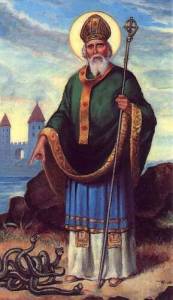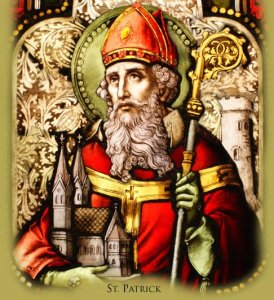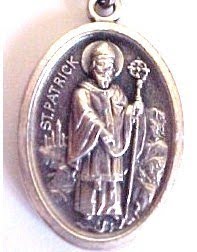Simple feast day celebrations take on a whole new meaning when they fall in Lent. Below are a few reflections and ideas to celebrate the feast of St. Patrick. (We are able to celebrate as a First Class feast vs. they typical commemoration since he is the patron saint of our diocese. But this year it doesn’t matter since his feast falls on a Sunday.)
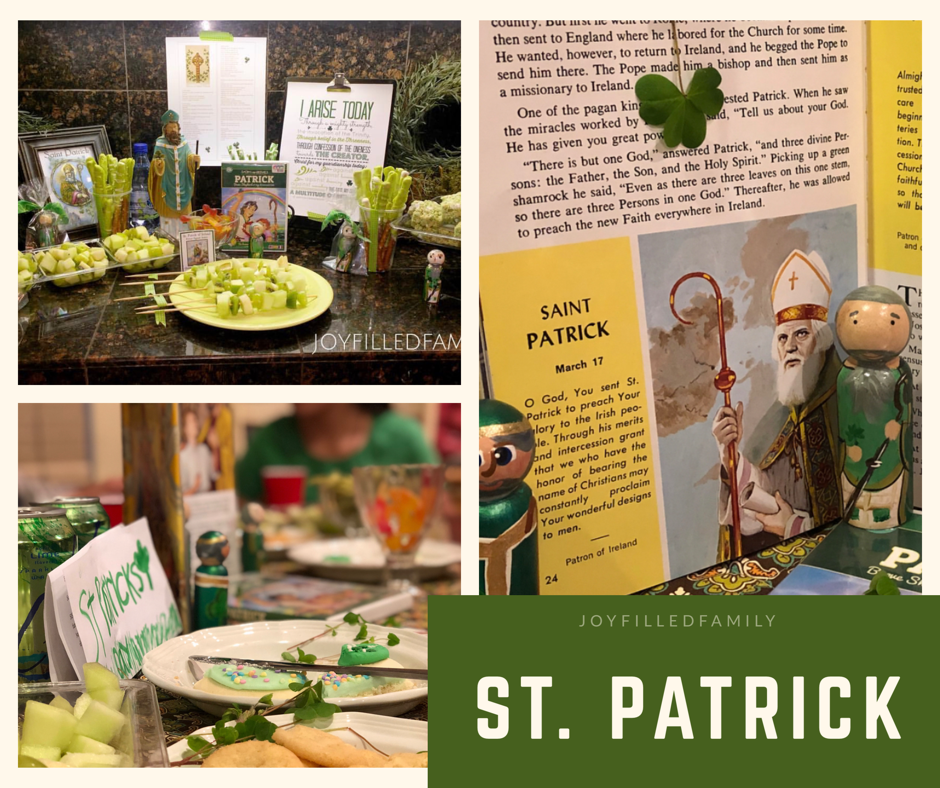
Toward the close of the fourth century, the pagan Irish captured during a slave-hunting raid the Christian youth who would become St. Patrick. The lad was put to work in Ireland as a pigherd for six years. Then he escaped, but with the intention of returning to the land of his captivity as an apostle. The former pigherd was ordained to the priesthood, and in 432 was made a bishop. The Pope himself commissioned Patrick to carry the Faith to Ireland. In his apostolic travels St. Patrick covered the length and breathe of the island. He overcame heartbreaking difficulties and sorrows, because he made Christ his sole changeless friend and helper.
O God, You sent Your blessed confessor bishop Patrick to preach Your glory among the nations. May we fulfill all the duties commanded of us through his merits and intercession. Through Our Lord . . .
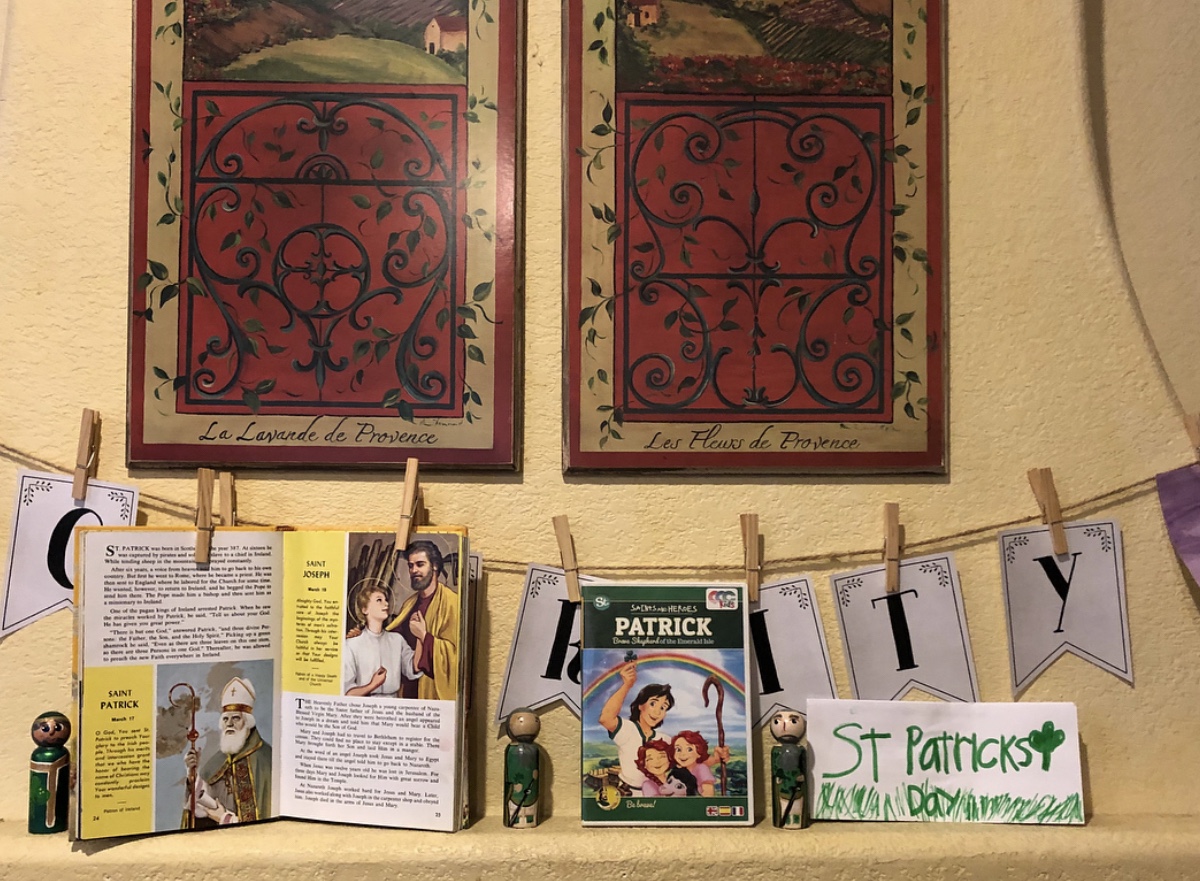
SAINT PATRICK
Pictorial Lives of the Saints
If the virtue of children reflects an honor on their parents, much more justly is the name of Saint Patrick rendered illustrious by the innumerable lights of sanctity with which the Church of Ireland shone during many ages, and by the colonies of Saints with which it peopled many foreign countries; for, under God, its inhabitants derived from their glorious apostle the streams of that eminent sanctity by which they were long conspicuous to the whole world. Saint Patrick was born towards the close of the fourth century, in a village called Bonaven Taberniae, which seems to be the town of Kilpatrick, on the mouth of the river Clyde, in Scotland, between Dumbarton and Glasgow. He calls himself both a Briton and a Roman, or of a mixed extraction, and says his father was of a good family named Calphurnius, and a denizen of a neighboring city of the Romans, who not long after abandoned Britain, in 409. Some writers call his mother Conchessa, and say she was niece to Saint Martin of Tours.
In his sixteenth year he was carried into captivity by certain barbarians who took him into Ireland, where he was obliged to keep cattle on the mountains and in the forests, in hunger and nakedness, amidst snows, rain, and ice. Whilst he lived in this suffering condition, God had pity on his soul, and quickened him to a sense of his duty by the impulse of a strong interior grace. The young man had recourse to Him with his whole heart in fervent prayer and fasting; and from that time faith and the love of God acquired continually new strength in his tender soul. After six months spent in slavery under the same master, Saint Patrick was admonished by God in a dream to return to his own country, and informed that a ship was then ready to sail thither. He went at once to the sea-coast, though at a great distance, and found the vessel; but could not obtain his passage, probably for want of money. The Saint returned towards his hut, praying as he went, but the sailors, though pagans, called him back, and took him on board. After three days’ sail they made land, but wandered twenty-seven days through deserts, and were a long while distressed for want of provisions, finding nothing to eat. Patrick had often spoken to the company on the infinite power of God, they therefore asked him why he did not pray for relief. Animated by a strong faith, he assured them that if they would address themselves with their whole hearts to the true God, He would hear and succor them. They did so, and on the same day met with a herd of swine. From that time provisions never failed them, till on the twenty-seventh day they came into a country that was cultivated and inhabited.
Some years afterward he was again led captive, but recovered his liberty after two months. When he was at home with his parents, God manifested to him, by divers visions, that He destined him to the great work of the conversion of Ireland. The writers of his life say that after his second captivity he travelled into Gaul and Italy, and saw Saint Martin, Saint Germanus of Auxerre, and Pope Celestine, and that he received his mission and the apostolical benediction from this Pope, who died in 432. It is certain that he spent many years in preparing himself for his sacred calling. Great opposition was made against his episcopal consecration and mission, both by his own relations and by the clergy. These made him great offers in order to detain him among them, and endeavored to affright him by exaggerating the dangers to which he exposed himself amidst the enemies of the Romans and Britons, who did not know God. All these temptations threw the Saint into great perplexities, but the Lord, whose will he consulted by earnest prayer, supported him, and he persevered in his resolution. He forsook his family, sold his birthright and dignity, to serve strangers, and consecrated his soul to God, to carry His name to the ends of the earth. In this disposition he passed into Ireland, to preach the Gospel, where the worship of idols still generally reigned. He devoted himself entirely to the salvation of these barbarians. He travelled over the whole island, penetrating into the remotest corners, and such was the fruit of his preachings and sufferings that he baptized an infinite number of people. He ordained everywhere clergymen, induced women to live in holy widowhood and continence, consecrated virgins to Christ, and instituted monks. He took nothing from the many thousands whom he baptized, and often gave back the little presents which some laid on the altar, choosing rather to mortify the fervent than to scandalize the weak or the infidels. He gave freely of his own, however, both to Pagans and Christians, distributed large alms to the poor in the provinces where he passed, made presents to the kings, judging that necessary for the progress of the Gospel, and maintained and educated many children, whom he trained up to serve at the altar. The happy success of his labors cost him many persecutions. A certain prince named Corotick, a Christian in name only, disturbed the peace of his flock. This tyrant, having made a descent into Ireland, plundered the country where Saint Patrick had been just conferring confirmation on a great number of neophytes, who were yet in their white garments after baptism. Corotick massacred many, and carried away others, whom he sold to the infidel Picts or Scots. The next day the Saint sent the barbarian a letter entreating him to restore the Christian captives, and at least part of the booty he had taken, that the poor people might not perish for want; but was only answered by railleries. The Saint, therefore, wrote with his own hand a letter. In it he styles himself a sinner and an ignorant man; he declares, nevertheless, that he is established bishop of Ireland, and pronounces Corotick and the other parricides and accomplices separated from him and from Jesus Christ, whose place he holds, forbidding any to eat with them, or to receive their alms, till they should have satisfied God by the tears of sincere penance, and restored the servants of Jesus Christ to their liberty. This letter expresses his most tender love for his flock, and his grief for those who had been slain, yet mingled with joy, because they reign with the prophets, apostles, and martyrs. Jocelin assures us that Corotick was overtaken by the divine vengeance.
Saint Patrick held several councils to settle the discipline of the Church which he had planted. Saint Bernard and the tradition of the country testify that Saint Patrick fixed his metropolitan see at Armagh. He established some other bishops, as appears by his Council and other monuments. He not only converted the whole country by his preaching and wonderful miracles, but also cultivated this vineyard with so fruitful a benediction and increase from heaven, as to render Ireland a most flourishing garden in the Church of God, and a country of Saints.
Many particulars are related of the labors of Saint Patrick, which we pass over. In the first year of his mission he attempted to preach Christ in the general assembly of the kings and states of all Ireland, held yearly at Tara, the residence of the chief king, styled the monarch of the whole island, and the principal seat of the Druids or priests, and their paganish rites. The son of Neill, the chief monarch, declared himself against the preacher; however, Patrick converted several, and, on his road to that place, the father of Saint Benignus, his immediate successor in the see of Armagh. He afterward converted and baptized the kings of Dublin and Munster, and the seven sons of the king of Connaught, with the greatest part of their subjects, and before his death almost the whole island. He founded a monastery at Armagh; another called Domnach-Padraig, or Patrick’s Church; also a third, named Sabhal-Padraig, and filled the country with churches and schools of piety and learning, the reputation of which, for the three succeeding centuries, drew many foreigners into Ireland. He died and was buried at Down, in Ulster. His body was found there in a church of his name in 1185, and translated to another part of the same church.
Ireland is the nursery whence Saint Patrick sent forth his missionaries and teachers. Glastonbury and Lindisfarne, Ripon and Malmesbury, bear testimony to the labors of Irish priests and bishops for the conversion of England. Iona is to this day the most venerated spot in Scotland. Columban, Fiacre, Gall, and many others evangelized the “rough places” of France and Switzerland. America and Australia, in modern times, owe their Christianity to the faith and zeal of the sons and daughters of Saint Patrick.
Reflection – By the instrumentality of Saint Patrick the faith is now as fresh in Ireland, even in this cold nineteenth century, as when it was first planted. Ask him to obtain for you the special grace of his children, to prefer the loss of every earthly good to the least compromise in matters of faith.
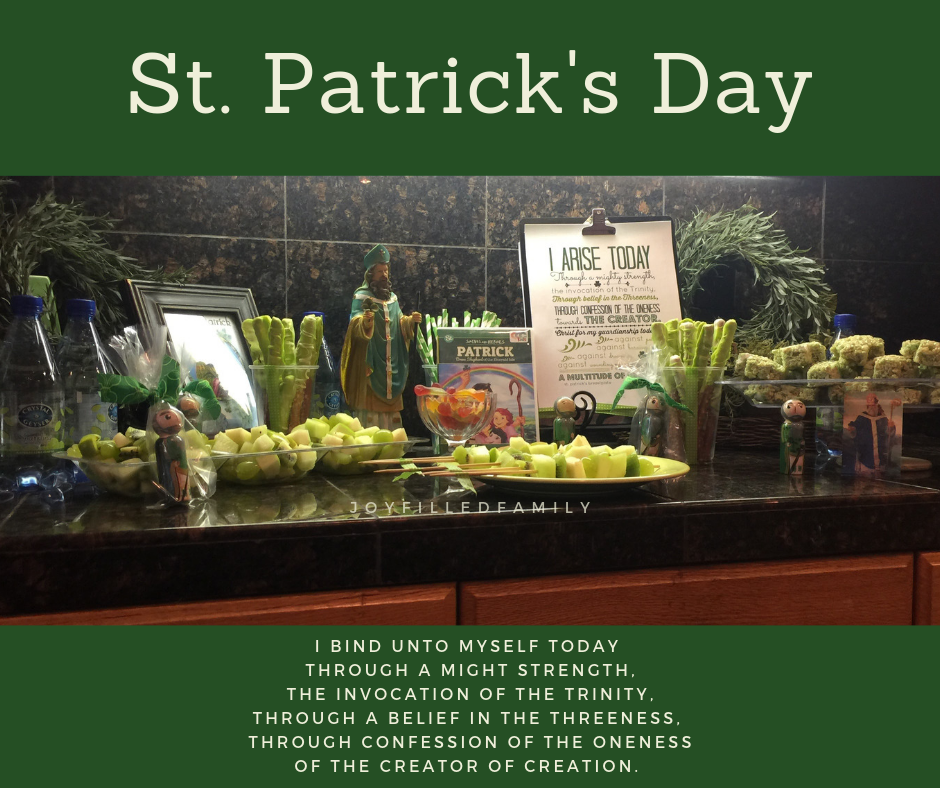
ST. PATRICK’S TEA
- Holy Trinity Shamrocks – Green shamrock Rice Krispie treats and cucumber tea sandwiches cut with shamrock cookie cutter
- St. Patrick’s Staff — Green chocolate dipped pretzel wands
- Serpents – Gummy worms
- Green fruit/veggie platter & kabobs
- Lime Sparkling Water
- Diffuse Lime, Grapefruit, and Bergamot — a great uplifting oils that radiate spring
- St. Patrick printable activities (see links below)
- View St. Patrick movie
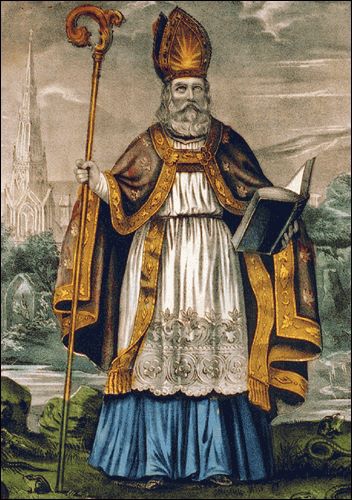
St Patrick’s Breastplate
I bind unto myself today
Through a might strength,
The invocation of the Trinity,
Through a belief in the Threeness,
Through confession of the Oneness
Of the Creator of creation.
I bind unto myself today
The strength of Christ’s birth and His baptism,
The strength of His crucifixion and His burial,
The strength of His resurrection and His ascension,
The strength of His descent for the judgment of doom.
I bind unto myself today
The strength of the love of the Cherubim
The obedience of angels,
The service of archangels,
The hope of resurrection to meet with reward,
The prayers of the patriarchs,
The preaching of the apostles,
The faith of confessors,
The innocence of virgins
The deeds of righteous men.
I bind unto myself today
The strength of heaven;
The light of the sun,
The splendor of fire,
The speed of lightning,
The swiftness of the wind,
The depth of the sea,
The stability of the earth,
The firmness of the rock.
I bind unto myself today
God’s strength to pilot me;
God’s might to uphold me,
God’s wisdom to guide me,
God’s eye to look before me,
God’s ear to hear me,
God’s word to speak for me,
God’s hand to guard me,
God’s way to lie before me,
God’s shield to protect me,
God’s hosts to save me
From the snares of the devil,
From the temptations of vices,
From the lusts of nature
From every one who desires me ill,
Afar and anear,
Alone or in a multitude.
I summon today all these powers
Between me and evil,
Against every cruel merciless power that opposes my body and soul;
Against the incantations of false prophets,
Against the black law of pagandom,
Against the false laws of heretics,
Against the craft of idolatry,
Against spells of women and smiths and wizards,
Against every knowledge that corrupts man’s body and soul.
Christ shield me today
Against poison, against burning,
Against drowning, against wounding,
So that reward may come to me in abundance.
Christ with me, Christ before me,
Christ behind me, Christ in me,
Christ beneath me, Christ above me,
Christ on my right, Christ on my left,
Christ when I lie down, Christ when I sit down,
Christ in the fort, Christ in the chariot,
Christ in the captain’s deck of a ship,
Christ in the heart of every man who thinks of me,
Christ in the mouth of every man who speaks of me,
Christ in the eye that sees me,
Christ in the ear that hears me.
I bind unto myself today
Through a mighty strength,
The invocation of the Trinity,
Though a belief in the Threeness,
Through a confession of the Oneness
Of the Creator of creation.
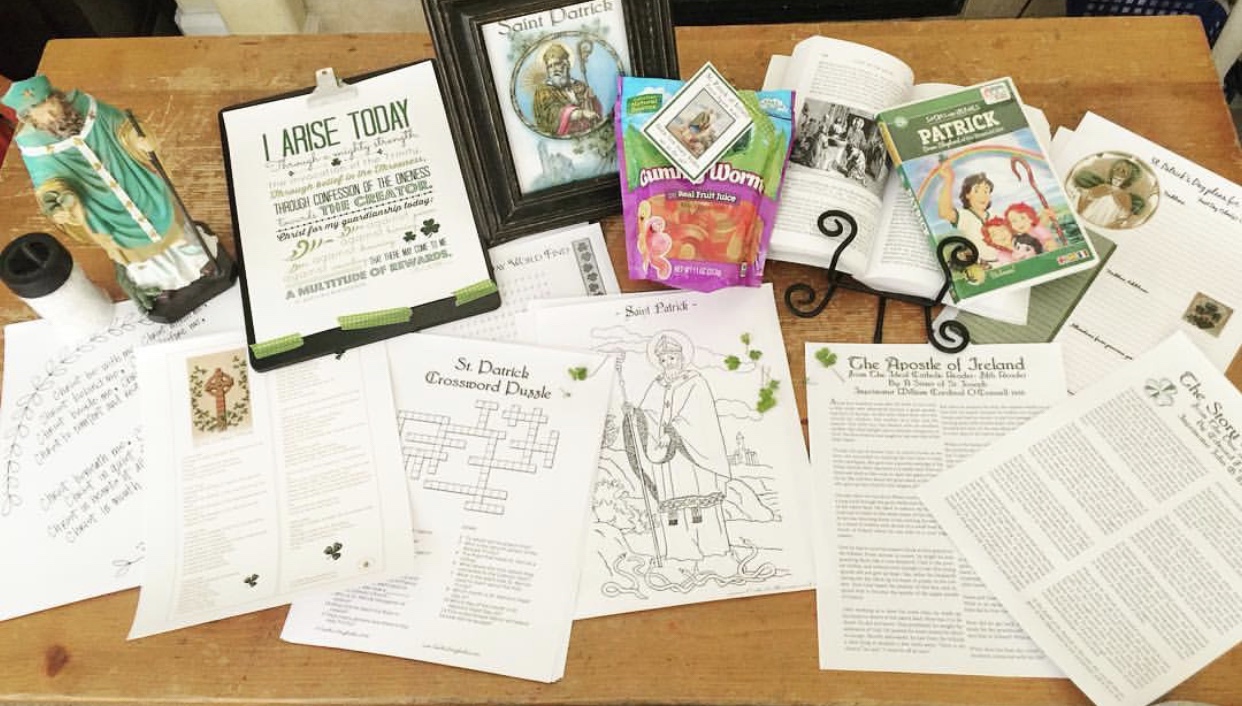
RESOURCES:
- More St. Patrick Inspiration — JOYFILLEDFAMILY Pinterest
- Blessed Trinity Shamrock – Catechism Lesson/Craft – Shower of Roses
- St. Patrick and the Easter Fire – Sensus Fidelium
- Confessions of St. Patrick – This LibriVox recording of this short autobiography by St. Patrick,
- The Poetic Life of St. Patrick – SSPX
- St. Patrick Audio Story and Other Saint StoriesRegina Martyrum

 I decided that this was the perfect opportunity to treat my GFG to a childhood novelty of mine.
I decided that this was the perfect opportunity to treat my GFG to a childhood novelty of mine.![[Saint Patrick]](https://joyfilledfamily.com/wp-content/uploads/2011/03/saintp01.jpg)
